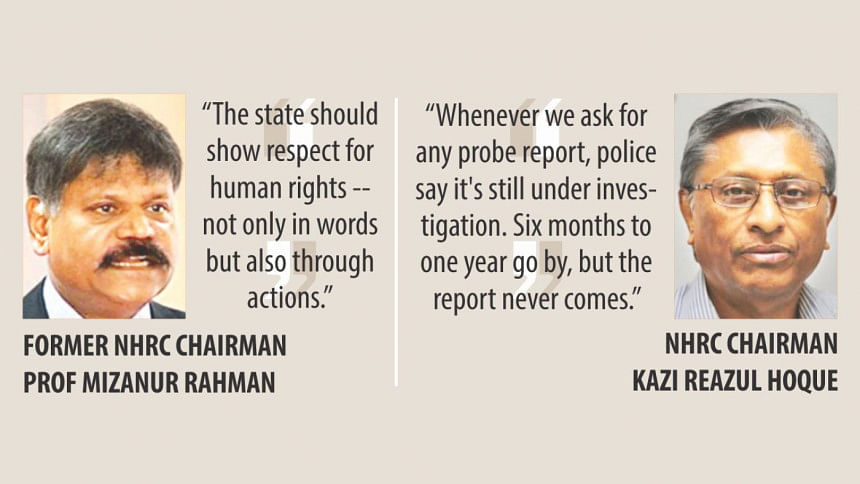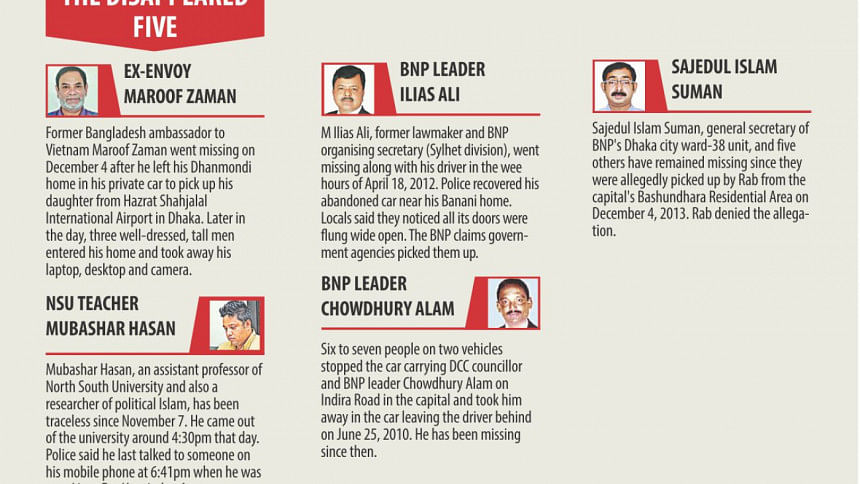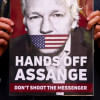Int'l Human Rights Day Today: Crimes grow in state's silence

KM Shamim Akhter was forced into a microbus near his Paltan home on the morning of September 29, 2011 by five to six armed men claiming to be members of a law enforcement agency.
His wife Jhorna Khanam and other family members left no stone unturned to find him out. But he still remains traceless.
Having received no positive response from police and Rab, Jhorna lodged a complaint with the National Human Rights Commission (NHRC), which sent her letters, only to inform that it was yet to get any answer from the state.
“The commission at one stage stopped writing to me finding no further response from the home ministry. Nobody communicates us anymore,” Jhorna told The Daily Star on Friday.
She is not the only one.
The NHRC is yet to find an answer for the relatives of victims of 154 incidents of enforced disappearance, custodial torture and death, extrajudicial killing and other rights violation from 2012 till last year. It did not get investigation reports on those incidents even after writing as many letters.
Amid such poor response from the state and negligence in finding the perpetrators, the nation is observing International Human Rights Day today.
The day means nothing to Baishakhi Afreen, wife of Rahmatullah Sentu, a victim of enforced disappearance.
“What is the value of the day to the families of the victims? My three minor children could not see their father for more than three years after law enforcers took him away right before my eyes,” said Afreen.
Sentu, a transport owner, has been missing since he was picked up in Old Dhaka on April 9, 2014.
Since August 22 this year, at least 12 persons, including former ambassador to Vietnam Maroof Zaman, North South University teacher Mubashar Hasan and journalist Utpal Das, became victims of enforced disappearance or abduction.
Three of them returned while three others have been found arrested by police.
The NHRC writes to the home ministry and the Police Headquarters seeking explanations when allegations of any rights violation by the law enforcers is reported or raised.
According to an NHRC document, the commission is waiting for the probe reports on 154 incidents, which include 32 custodial tortures or deaths, 25 enforced disappearances and 12 extrajudicial killings and some harassments of civilians by law enforcers.
Of the 154 letters dispatched asking for probe reports, four were sent in 2012, 10 in 2013, 51 in 2014, 73 in 2015 and 16 in 2016.
“Whenever we ask for any probe report, police say it's still under investigation. Six months to one year go by, but the report never comes,” NHRC Chairman Kazi Reazul Hoque said at a programme on Tuesday.
Talking to The Daily Star on Thursday, he said the commission has got replies to some of their letters while many are still pending.

Most of the probe reports the police so far sent to the NHRC found no involvement of law enforcers in the incidents, he added. In some cases the commission was informed of action taken after investigation.
Speaking on the issue, former NHRC chairman Prof Mizanur Rahman said the state should show respect for human rights -- not in only words but also through actions.
“When National Human Rights Commission wants explanation for any incident [of rights violation], prompt action should be taken.”
He also said, “If the commission is made toothless, the whole society and the country have to pay for it. Human rights situation deteriorates in that case.”
Rights activist Nur Khan Liton said the state or police respond only to insignificant queries, not to the serious allegations that the NHRC asks about following complaints of victims' families and fact-finding reports of other human rights organisations.
“When the state does not respond to the National Human Rights Commission, it can be easily assumed what happens to the common people,” he said.
“For this,” he observed, “killings in the name of crossfire, incidents of enforced disappearance and misuse of section 57 are on the rise while the space for freedom of speech is shrinking.”
He added that the state's silence on these incidents encourages others criminals.
Asked about the NHRC letters, Saheli Ferdous, assistant inspector general of police (media and public relations) at the Police Headquarters, said steps will be taken gradually.
According to rights body Ain o Salish Kendra (ASK), as many as 519 people have reportedly became victims of enforced disappearance between 2010 and July 2017 in the country and 329 of them were still missing.
Hands of Rab, police and an intelligence agency behind such incidents were invariably alleged by families of victims. Their allegations either drew denial or were lost in silence.
In 13 years since 2004, more than 1,900 people have become victims of extrajudicial killings involving police, Rab and joint forces. At least 350 met such deaths alone in 2005, according to the ASK.
Nearly 800 have died in the custody of law enforcement agencies, which are bound by the law to protect the detainees.


 For all latest news, follow The Daily Star's Google News channel.
For all latest news, follow The Daily Star's Google News channel. 







Comments